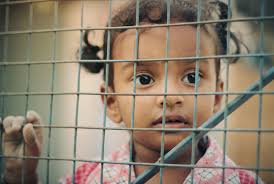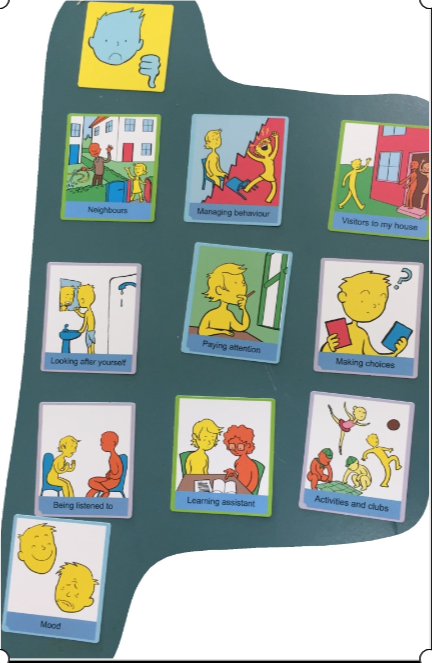Supporting families involved in the criminal justice system.
Sally Kedge, Speech and Language Therapist from Trouble Talking New Zealand shares two powerful case examples of using Talking Mats with children and families caught up in the criminal justice system.
This week it was hot in New Zealand, so I sat under a tree in a school playground in the shade with an eight-year-old girl to do a Talking Mat. I’m a speech-language therapist engaged by the child protection agency who have guardianship of her. This doesn’t happen that often in NZ but the team involved with this girl and her brother realised that as well as dissociative behaviour related to the impact of trauma due to family violence exposure, there was also significant difficulty with language acquisition for both children. The mix of a trauma history and a language disorder was resulting in significant difficulty expressing emotions and explaining what had happened when behavioural outbursts happened.
Some of my work with this child has been to help the team understand how her language profiles impacts on her life, and to develop her language skills at school via a programme she carries out with a teacher-aide and a friend. My role has also involved helping her understand her own life story and to equip her to process this, as it hasn’t been a pretty ride so far.
At a multidisciplinary planning meeting for her and her sibling recently, the team were concerned to make sure the children had accurate information about when their father was going to be released from prison. Their mother has recently been released too but no one knows where she is currently. I suggested a Talking Mat might help us to find out what she knows at the moment about her parents and how she felt about the next few months, as there are likely to be some changes happening in her world. We wanted to give her accurate information so she didn’t need to fill in the gaps herself.
Using a Talking Mat helped me establish that currently this child feels many things in life are going well. This is good progress. However, we identified a few things that she felt were not going that well at school (‘in the middle’) and I was then able to talk to her teachers about preparing for the new school year starting in February. We figured out that she is looking forward to seeing her dad but doesn’t know when she will see him or where he is going. A conversation with her Social Worker and the drug rehabilitation residence has allowed me to put together some visuals and a timetable to show what is going to happen next. Dad can have these as well as her carer and others in her team.
Another child with a similar history also did a Talking Mat with me last week. My purpose was to help the team find out how he feels his current care situation is going. A very mixed picture emerged with some concerning cards placed in ‘not going well’. I asked the boy at the end if he knew anyone who could help him with those things and he said, ‘no one’. I was able to explain that I am one of the adults who need to figure out how to make life easier for him and I would talk to some other adults and come back to see him. The photo I took of the Talking Mat allowed me to follow up with the team and I took the photo back to the boy to explore further some of the ‘not going well’ cards. At this second visit, this boy initially did not want to speak at all, but he engaged fully in looking at the photo of the Talking Mat with me.
We used a scale of 1 – 5 (how much of a problem is this for you – 1 = not much, = 5 = really really bad) on a piece of paper that he could mark with a pen to explore the ‘not going well’ items in the photo. He picked out ‘mood’, ‘people coming to his house’ and ‘learning at school’ as ‘really really bad’. We agreed that these needed to get sorted out for him to make life easier and we agreed who I could talk to about these things. Once we got that agreed and written down, he initiated some conversation about less heavy topics and started playing. I’m now following up with the team. Easier said than done, but without the Talking Mat I don’t think we would have got his views so clearly.
Our Talking Trouble Aotearoa NZ team is involved with children, young people and adults involved with care and protection, justice, mental health and behaviour agencies. We have been very excited about the wide range of opportunities that Talking Mats has provided us and the professionals we work with to explore people’s views on their own situations, their preferences, and their well-being. This year we’ve been exploring how Talking Mats might be used in our contexts:
– in sexual assault health assessments undertaken by specialised health professionals
– for Social Workers in our Youth Justice and Care and Protection Communication Projects
– When finding out about how people feel about talking and understanding in legal contexts such as courts and Family Group Conferences when we are engaged as court-appointed Communication Assistants (equivalent to ‘intermediaries’),
– and in our own speech-language therapy assessments and interventions.
The social workers, paediatricians, teachers, lawyers and others we work with have also been excited about exploring how Talking Mats can assist in these contexts. We’re looking forward to more training from the Talking Mats team next year.
sallykedge@talkingtroublenz.org
Come and hear Sally speak at our Criminal Justice Seminar on the 17th of April 2018. Contact info@talkingmats.com for more information.
 Online training login
Online training login 





